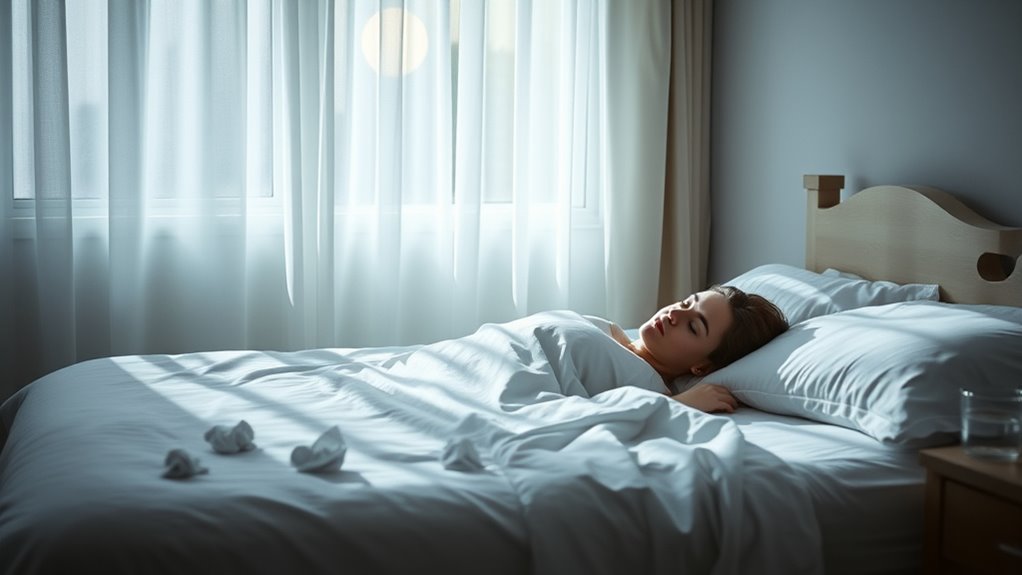Stress can disrupt your sleep by increasing arousal, altering hormones like cortisol, and confusing your internal clock, making it harder to fall and stay asleep. It also interferes with sleep stages and circadian rhythms, creating a cycle where poor sleep increases stress and vice versa. To break this cycle, managing stress through relaxation techniques, maintaining good sleep habits, and building resilience can help restore restful sleep. Discover more ways to improve your sleep and reduce stress.
Key Takeaways
- Practice relaxation techniques like mindfulness, deep breathing, and progressive relaxation to reduce stress before bedtime.
- Maintain a consistent sleep schedule and create a calming sleep environment to improve sleep quality.
- Incorporate physical activity and social support to build resilience against stress-related sleep disturbances.
- Manage physical health issues and mental health conditions that contribute to sleep disruption.
- Develop long-term stress coping strategies to prevent the cycle of stress and poor sleep from perpetuating.
How Stress Alters Sleep Stages and Quality

Stress directly influences how you progress through sleep stages and affects overall sleep quality. When you’re stressed, it can take longer for you to fall asleep, increasing your sleep latency. This happens because stress activates your HPA axis, releasing hormones like cortisol that interfere with sleep initiation. Elevated cortisol levels disrupt your body’s natural sleep-wake cycle, making it harder to reach restorative sleep stages. Stress also fragments your sleep, causing microarousals that break sleep cycles and reduce sleep continuity. As a result, your shift through light and deep sleep becomes disrupted, leaving you feeling less rested. Chronic stress can further disturb your circadian rhythm, compounding sleep issues and making restful sleep more elusive. This cycle hampers your ability to enjoy restorative sleep and impacts overall well-being.
The Neural Impact of Stress on Restorative Sleep

Your brain actively detects stress through specialized neural circuits, which then influence the processes that regulate restorative sleep. The midbrain stress detection circuit triggers sleep-promoting signals via the lateral hypothalamus, helping you recover from stress. VTA Vgat-Sst cells play a key role by inhibiting corticotropin-releasing factor release, aiding in stress relief and sleep induction. When stress activates midbrain cells, it can cause persistent sleep effects, including disruptions in REM and non-REM stages. Stress also heightens activity in the noradrenergic LC neurons, leading to frequent arousals and REM suppression. Neural pathways from stress-detecting neurons to sleep centers attempt to restore balance, but chronic stress can dysregulate these circuits. This neurobiological response influences your sleep quality and your brain’s ability to recover from daily stressors. Additionally, AI security research highlights the importance of monitoring neural circuit activity to prevent potential dysregulation caused by prolonged stress. Furthermore, understanding the neural mechanisms involved in stress response can inform targeted interventions to improve sleep health. Advances in automation technologies may offer future solutions for real-time monitoring and managing stress-related sleep disturbances, especially as they relate to neural circuit activity.
Understanding the Hormonal Disruption in Stress-Related Sleep Problems

Hormonal disruptions play a central role in sleep problems linked to stress, as imbalances in key hormones interfere with the body’s natural sleep-wake cycle. When you’re stressed, cortisol levels rise, especially at night, making it harder to fall asleep and stay asleep. Chronic stress keeps cortisol elevated, disrupting circadian rhythms and suppressing progesterone, which promotes relaxation and sleep. Elevated cortisol also inhibits melatonin, the hormone essential for sleep onset, leading to insomnia. Additionally, stress can disturb thyroid hormones, causing either hyper- or hypothyroidism, both of which impair sleep quality. Hormonal shifts in ghrelin and leptin further affect sleep by influencing appetite and wakefulness. Together, these disruptions create a hormonal environment that sabotages restful sleep, fueling the cycle of stress and sleep disturbance. Understanding these hormonal imbalances can help in developing targeted strategies to improve sleep health. Furthermore, hormonal regulation through lifestyle changes and proper management can play a vital role in breaking this cycle. Recognizing how hormonal fluctuations impact sleep patterns allows for more effective interventions and personalized approaches to restoring balance. Additionally, being aware of how external factors like diet and stress management influence hormone levels can support overall sleep quality and well-being. Incorporating relaxation techniques such as mindfulness or meditation can also positively affect hormonal balance and promote better sleep.
The Bidirectional Relationship Between Stress and Sleep

Your stress levels can worsen your sleep, making it harder to fall asleep and stay asleep. At the same time, poor sleep can increase your stress the next day, creating a cycle. Understanding this two-way relationship helps you find better ways to break the pattern and improve both. Incorporating stress management techniques like mindfulness or deep breathing may help support healthier sleep patterns. Recognizing the importance of sleep quality in emotional regulation can further aid in managing stress effectively. Utilizing sound design principles, such as ambient sounds or calming audio, can also promote relaxation and improve sleep onset. For some, tuning techniques used in vehicle modifications, like acoustic enhancements, can foster a more calming environment conducive to restful sleep.
Sleep Affects Stress Levels
Sleep and stress influence each other in a two-way cycle, meaning that poor sleep can increase stress levels, while high stress can disrupt sleep quality. When you don’t get enough restful sleep, your mood worsens, and anxiety or depression may develop, further raising your stress. Shorter sleep durations are linked to higher stress and anxiety, while longer sleep can help reduce these feelings. Sleep also regulates stress hormones like cortisol; without enough rest, these hormones become unbalanced, heightening your stress response. Additionally, poor sleep affects your brain’s functioning and circadian rhythms, making you more sensitive to stress. Incorporating educational toys that promote relaxation and mindfulness can support better sleep habits and reduce stress. Developing positive sleep habits can help lower stress levels, showing how critical sleep is in managing your overall stress response. Research shows that sleep quality directly impacts your resilience to daily stressors and overall mental health.
Stress Disrupts Sleep Patterns
The way stress impacts sleep patterns creates a challenging cycle that can be hard to break. When you’re stressed, it takes longer to fall asleep and your sleep becomes fragmented, especially if you have a reactive sleep system. Chronic stress can cause persistent sleep disturbances, lowering both sleep quality and duration. It activates your body’s stress response, involving the HPA axis, which disrupts your circadian rhythm and neurological pathways that regulate sleep. Stress also weakens emotion regulation, leading to rumination and heightened psychological arousal at bedtime. These factors make it difficult to unwind and fall asleep, creating a vicious cycle where poor sleep increases stress. Incorporating relaxation techniques such as deep breathing or aromatherapy may help reduce stress levels and promote better sleep. Implementing stress management strategies can be crucial in reducing the activation of your body’s stress response and restoring healthy sleep patterns. Additionally, understanding the importance of financial aspects during stressful times can help individuals manage related anxieties, which in turn may improve sleep quality. Developing healthy sleep habits can also be effective in breaking this cycle and promoting restorative sleep. Recognizing the role of support systems can provide emotional relief and buffer against stress, aiding in sleep recovery. Managing stress effectively is essential to breaking this cycle and restoring healthy sleep patterns.
Circadian Rhythm Changes Due to Chronic Stress

Chronic stress can profoundly disrupt your body’s internal clock by affecting the suprachiasmatic nucleus (SCN), the brain’s master circadian pacemaker. When stressed long-term, your SCN’s rhythmic signals become altered, disturbing the synchronization of your sleep-wake cycle. This disruption can lead to changes in hormone signaling, particularly stress hormones like cortisol, which normally follow a daily pattern. As a result:
Chronic stress disrupts the body’s internal clock by impairing the master circadian regulator, the SCN.
- The timing of cortisol release becomes irregular, flattening its usual peak and trough.
- Peripheral clocks in organs like the liver and immune system shift phases, causing systemic rhythm disturbances.
- Tissue-specific responses vary, further desynchronizing your body’s metabolic and repair processes.
- These shifts impair overall physiological harmony, increasing vulnerability to health issues linked to disrupted circadian regulation.
- Growing interest in alternative investments like Gold IRAs reflects efforts to stabilize financial well-being during periods of stress, highlighting how external factors can impact overall health and security.
- Additionally, understanding the underlying molecular mechanisms of circadian disruption can inform targeted therapies to restore synchronization and improve health outcomes, especially considering the influence of famous personalities who have contributed to our understanding of biological rhythms and stress management.
- Further research into sleep hygiene practices can assist in mitigating some of these disruptions and promote better circadian alignment during stressful times.
Physical and Mental Symptoms That Interfere With Rest

Physical and mental health issues can considerably interfere with your ability to rest well. If you experience pain from conditions like fibromyalgia or musculoskeletal issues, falling asleep and staying asleep becomes challenging. Heart problems or respiratory conditions such as COPD can cause discomfort or breathing difficulties that disturb your sleep. Kidney disease often leads to insomnia or restless legs, while gastrointestinal issues like heartburn cause discomfort at night. Mentally, anxiety, depression, and chronic stress heighten arousal, making it hard to relax and fall asleep. Trauma-related disorders like PTSD also contribute to sleep disturbances. Additionally, neurological conditions such as Parkinson’s or seizure disorders can disrupt sleep patterns. These physical and mental symptoms create a cycle that hampers restful sleep, affecting overall well-being and stress management.
Individual Factors and Vulnerability to Stress-Induced Sleep Issues

Your vulnerability to stress-induced sleep issues depends on various individual factors that influence how you respond to stress. These factors shape your likelihood of experiencing sleep disturbances when stressed. For example, if you have high stress reactivity, your body reacts intensely to stressful events, making sleep harder. A sensitive sleep system can also heighten insomnia risk under stress. Low resilience means you recover less easily from stress, increasing sleep problems. Additionally, how you handle thoughts and emotions—such as worry or emotional dysregulation—can worsen sleep issues.
- High stress reactivity increases your response to stress.
- Sensitive sleep systems make you more prone to insomnia.
- Low resilience reduces your ability to recover from stress.
- Cognitive-emotional responses like worry can exacerbate sleep problems.
Strategies to Reduce Stress and Promote Better Sleep

Implementing relaxation techniques and creating a sleep-friendly environment can considerably reduce stress and improve your sleep quality. Try mindfulness meditation or guided imagery to calm your mind, and practice deep breathing or progressive relaxation to release physical tension. Incorporate calming scents like lavender through aromatherapy to enhance relaxation. Make your bedroom quiet, dark, and cool, avoiding electronic devices that emit blue light—this helps signal your body it’s time to rest. Engaging in gentle activities such as light stretching or yoga in the evening can also ease muscle tension. A warm bath or shower before bed relaxes muscles, while reading or journaling clears your mind. Establishing a consistent sleep routine, including a regular bedtime and relaxation habits, further supports stress reduction and better sleep.
Lifestyle Habits That Support Healthy Sleep Amid Stress

Establishing a consistent sleep schedule helps your body recognize when it’s time to rest, even during stressful times. Practicing relaxation techniques like deep breathing or meditation before bed can calm your mind and ease the passage to sleep. By making these habits routine, you support healthier sleep patterns despite life’s pressures.
Establish Consistent Sleep Schedule
Maintaining a consistent sleep schedule is a powerful way to support healthy sleep and reduce stress. When you go to bed and wake up at the same times daily, your body’s internal clock stays regulated, helping lower stress levels and improve sleep quality. It also promotes hormonal balance, ensuring stress-related hormones are released predictably. Additionally, a steady schedule encourages healthier habits overall and supports your long-term health. To establish this, consider:
- Maintaining a routine with set bed and wake times
- Avoiding irregular sleep patterns like sleeping in on weekends
- Creating a sleep-friendly environment—dark, quiet, cool
- Limiting stimulating activities before bed
Sticking to these habits helps you fall asleep faster, stay asleep longer, and wake feeling refreshed, reducing stress and enhancing well-being.
Practice Relaxation Techniques
Practicing relaxation techniques can markedly support healthy sleep, especially when stress makes falling asleep difficult. Mindfulness and relaxation methods improve over time and are linked to better sleep quality. Techniques like deep breathing, muscle relaxation, and mindfulness meditation help calm your mind and body, reducing stress that interferes with rest. Relaxation massages before bed can boost sleep efficiency, while breathing exercises combined with muscle relaxation promote behavioral changes that lessen sleep disturbances. Consistent practice not only helps you fall asleep faster but also sustains improvements over months. These techniques also enhance emotional coping, making stress easier to manage. Incorporating relaxation practices into your nightly routine can create a calming environment, supporting long-term sleep health and helping break the cycle of stress and sleeplessness.
Building Resilience to Break the Stress-Sleep Cycle

How can you break the vicious cycle of stress and poor sleep? Building resilience is key. When you strengthen your ability to cope with stress, you can protect your sleep quality and prevent disruptions. Resilience acts as a buffer, reducing the impact of stress on your sleep patterns. Prioritizing sleep wellness helps maintain healthier sleep stages, especially NREM sleep, which boosts resilience. Consistently managing stress through techniques like mindfulness, physical activity, and social support enhances your capacity to recover from stressful events. Developing these habits creates a positive feedback loop—better sleep improves resilience, which in turn makes it easier to handle stress. Focus on these strategies to disrupt the cycle and promote lasting mental and physical health.
- Maintain a consistent sleep schedule
- Practice stress management regularly
- Build strong social connections
- Engage in self-care activities
Frequently Asked Questions
How Does Stress Affect Dream Content and Emotional Processing During Sleep?
Stress influences your dreams by making them more vivid, emotional, and memorable. When you’re stressed, your dreams often replay intense memories or threaten scenarios, helping you process emotions and rehearse responses. This emotional processing links negative memories with safer contexts, reducing anxiety. However, ongoing stress can lead to frequent, distressing dreams that interfere with sleep quality, making emotional regulation harder and possibly worsening your mental health over time.
Can Specific Sleep Disorders Be Exacerbated by Chronic Stress?
Chronic stress can worsen specific sleep disorders like insomnia and sleep apnea. When you’re under prolonged stress, it activates your HPA axis, raising cortisol levels that disrupt your sleep patterns. This can make falling asleep, staying asleep, or breathing during sleep more difficult. Stress also impacts circadian rhythms and increases anxiety, which further exacerbates these disorders. Managing stress through relaxation, sleep hygiene, or therapy can help reduce their severity.
What Are the Long-Term Health Consequences of Disrupted Sleep Due to Stress?
Disrupted sleep due to stress can have serious long-term health consequences. You may develop high blood pressure, increasing your risk of heart disease and stroke. Your metabolism could change, leading to weight gain and diabetes. It can impair your brain function, causing memory issues and cognitive decline. Additionally, ongoing sleep problems can heighten anxiety, depression, and emotional distress, markedly lowering your overall quality of life and social well-being.
How Does Stress Impact Sleep Architecture Differently Across Age Groups?
Imagine you’re a young adult experiencing intense job stress; your sleep shifts toward more REM and less deep sleep, disrupting rest. Stress impacts sleep architecture differently across ages: in middle age, it causes more REM and less slow-wave sleep, while older adults face fragmented sleep and reduced quality. Your age influences how stress alters your sleep patterns, affecting overall health and daily functioning.
Are There Genetic Factors That Influence Vulnerability to Stress-Related Sleep Disturbances?
You might be surprised to learn that genetic factors play a significant role in your vulnerability to stress-related sleep issues. Variations in genes like “CLOCK” influence your internal clock, making you more susceptible when under stress. If you carry certain genetic markers, you’re more likely to experience sleep disturbances during stressful times. Recognizing this can help you pursue personalized strategies, like stress management or therapy, to improve your sleep health.
Conclusion
As you navigate life’s stresses, remember that sleep and stress subtly influence each other in unexpected ways. By understanding this delicate balance, you might find that small changes, like establishing routines or managing stress, can unexpectedly restore restful sleep. Sometimes, the key lies in recognizing how these factors intertwine—what seems coincidental may actually be the pathway to breaking the cycle and reclaiming your peace of mind and restorative rest.









